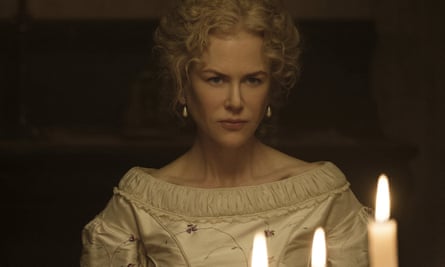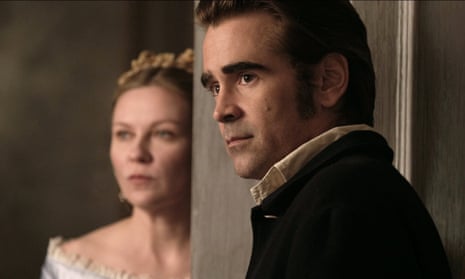Sofia Coppola delivers a very enjoyable southern melodrama, the tale of a handsome, badly wounded Union soldier in enemy terrain during the American civil war who throws himself on the mercy of a ladies’ seminary – of all the outrageous things. Their inhabitants are all of a decorous flutter at the idea of this semi-unclothed male to whom they must minister, intimately.
With its hilariously fraught psychodynamic, the film has hints of Black Narcissus and the famous Diet Coke ad about office workers admiring a perspiring worker slaking his thirst. It is adapted by Coppola from the 1966 Thomas P Cullinan novel - already filmed by Don Siegel in 1971 with Clint Eastwood in the lead role.
Coppola tells the story with terrific gusto and insouciant wit, tying together images from the first scene and the last, so that the narrative satisfyingly snaps shut. She also coolly leaves it to us to understand how the title applies to different characters as the tale wears on.
Colin Farrell plays Corporal John McBurney, an Irish soldier of fortune who joined the Union ranks for a cash inducement, and is now a deserter; he finds himself badly wounded in the leg, and terrified of being caught and shot by either side. He has therefore been stripped of the tribal or ideological baggage that might lead an audience to take his side against the tense southern belles who take him in. And the movie is at pains to stress that their slaves have already “fled” so they themselves do not appear tainted in such a way as to weight our sympathies against them. Yet Coppola finally contrives a female and arguably feminist perspective on this story that Don Siegel didn’t. It is certainly more subtle, with none of the sexualised fantasy and flashback screens that Siegel had. Instead, Coppola brings to the story a buried menace that reminded me of Ira Levin.

McBurney is on the point of losing consciousness and bleeding out, when he is discovered in neighbouring woodland by 11-year-old Miss Amy (a smart performance from Oona Laurence) and with a mysterious charm which is clearly part of his talent for survival, he persuades her to take him to her school. There, the headmistress Martha Farnsworth (Nicole Kidman) and her subordinate Edwina (Kirsten Dunst) are dismayed but also moved by his plight, by the opportunity fate has offered to demonstrate Christian charity, and by the realistic conviction that the war is all but over anyway. And as they have no menfolk – the pronoun “il” is primly excluded from their lessons in conjugating French verbs, and the only other male in the house is Amy’s pet turtle Henry – they find themselves interested in the virile man who is reassuringly disabled and at their tender mercies. Certainly, McBurney seems to attract the poutingly precocious 18-year-old Alicia, played by Elle Fanning.
So with the pupils’ bewildered and yet excited approval, Martha resolves not to turn McBurney over to the Confederate troops who periodically check up on them, and nurse him back to health, allowing him to work in the garden, where he digs the flowerbeds, prunes the roses, works up a sweat and slyly catches the eye of many of his new friends. Caddish and cunning, McBurney starts trifling with the attentions of different young women. It is a recipe for disaster, and students of Chekhov’s law about what happens to firearms which are introduced in act one will be alarmed at the pistol left to Martha by her father. Distant sounds of artillery let McBurney know that the storm of war is not far away, but it could be nothing to the retributive storm that is heading his way in any case.
There is tremendous entertainment value in the dinners and musical evenings that the women lay on for their guest. Nicole Kidman’s delivery of the line: “Would you cay-uh for a digestif, corporal?” is one of the most purely enjoyable things at this year’s Cannes. And when the emotional tempest finally descends, there some classic southern moments in this seminary which seems to look much like a plantation whose gardens are shot with slanting rays of golden sunlight, in the traditional style.
We get a glorious staircase scene, with someone actually falling down two separate flights, involving a change of direction. We get a necklace wrenched from a female neck, so that the beads roll calamitously all over the floor. We even get a gunshot which brings a chandelier crashing to the floor, an event which doesn’t need any metaphorical interpretation to make it sensational. It is a tremendously watchable movie, a drama-thriller with subtle touches of noir and black comedy.

Comments (…)
Sign in or create your Guardian account to join the discussion